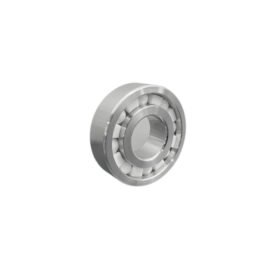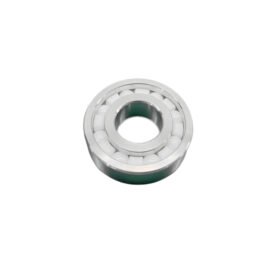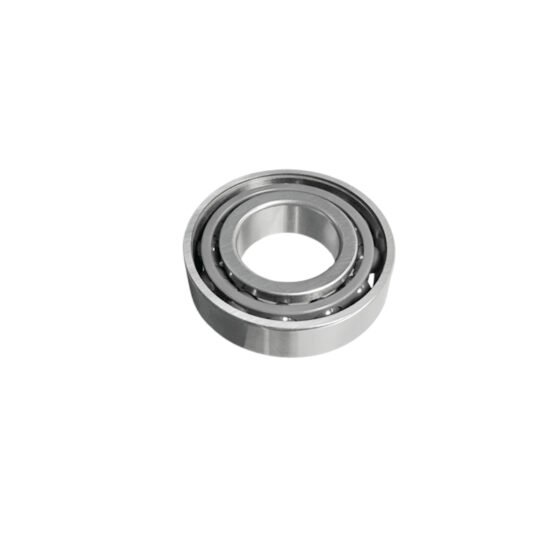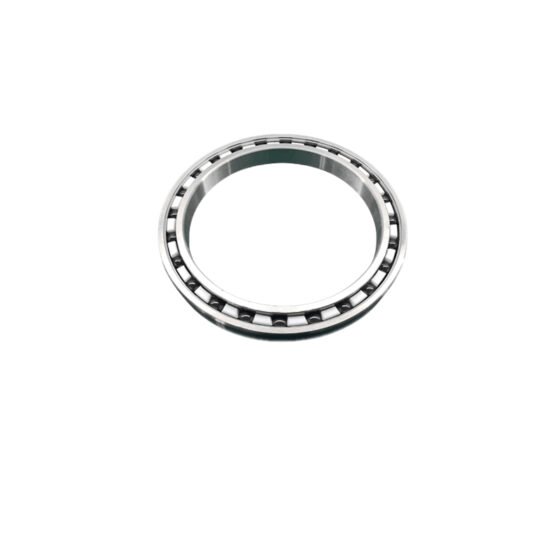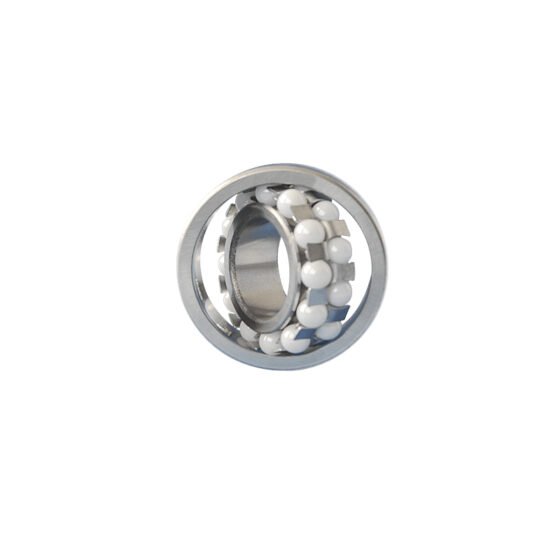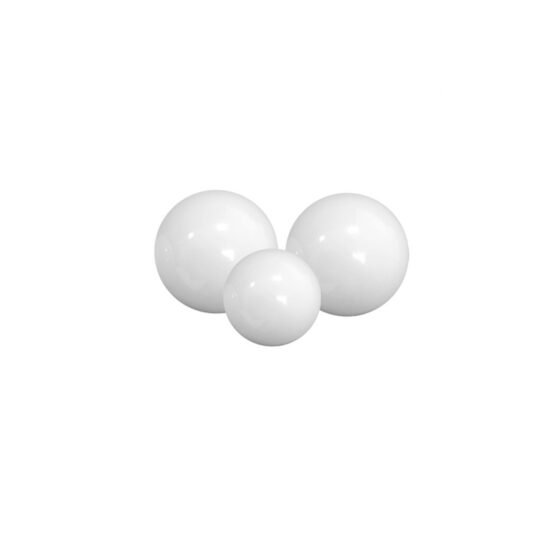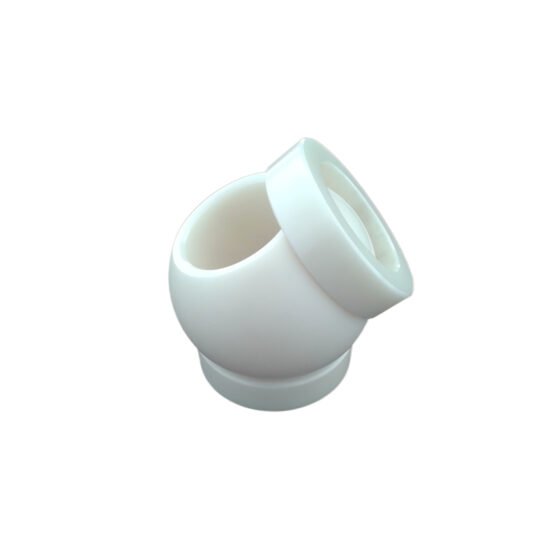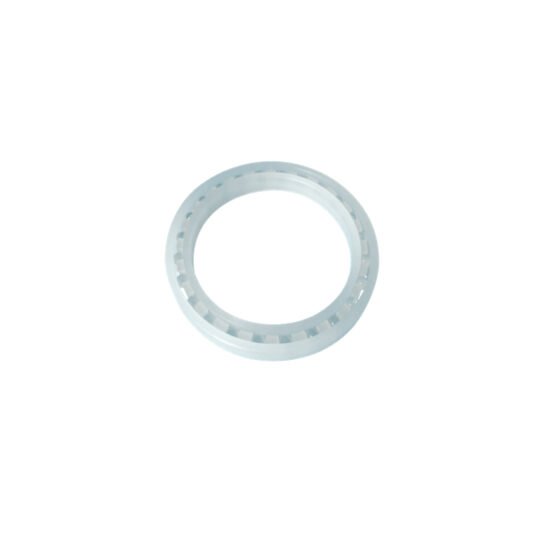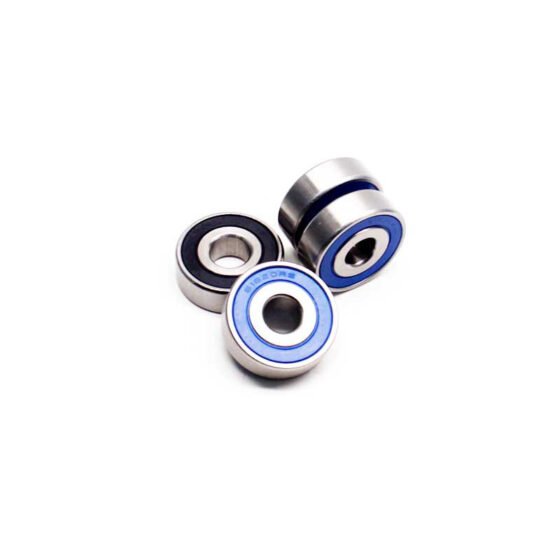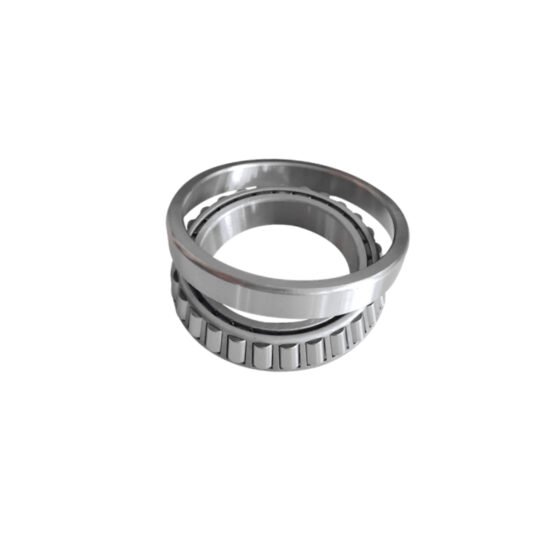Roulements à billes céramiques hybrides combining 440C stainless steel rings, Le ZrO2 (Zircone) Billes en céramique, et PTFE (Polytétrafluoroéthylène) Cages are designed for high-performance, precision applications. These bearings offer excellent durability, résistance à la corrosion, and low friction in challenging environments.
Key Features of 440C/ZrO2/PTFE Hybrid Ceramic Ball Bearings
- Matériau des billes (Le ZrO2):
- High toughness and wear resistance.
- Exceptional performance in corrosive and high-temperature conditions.
- Matériau de l'anneau (440C Stainless Steel):
- High hardness and corrosion resistance.
- Excellent for moderately aggressive environments and heavy loads.
- Matériau de la cage (PTFE):
- Lightweight, chemically inert, and self-lubricating.
- Minimizes friction and ensures smooth, quiet operation.
- High Corrosion Resistance:
- Ideal for humid, chemical, and marine environments.
- Low Friction and Noise:
- Enhanced efficiency with minimal vibration and noise.
- Large plage de températures:
- Operates effectively from -50°C to +250°C.
- Léger et durable:
- ZrO2 ceramic balls reduce overall weight and centrifugal forces.
Applications of 440C/ZrO2/PTFE Hybrid Ceramic Ball Bearings
- Dispositifs médicaux:
- Hygienic and corrosion-resistant for surgical and diagnostic equipment.
- Aerospace:
- Lightweight and durable for high-precision aviation systems.
- Traitement chimique:
- Withstands corrosive chemicals and high temperatures.
- Marine Applications:
- Resists saltwater corrosion for long-lasting performance.
- Food and Beverage Processing:
- Suitable for clean and hygienic environments.
- Systèmes d'énergie renouvelable:
- High efficiency in wind turbines and solar trackers.
- Fabrication de semi-conducteurs:
- Ideal for cleanroom and vacuum environments.
Advantages of 440C/ZrO2/PTFE Hybrid Ceramic Bearings
- Durable Performance: Withstands heavy loads and harsh operating conditions.
- Résistance à la corrosion: Designed for marine, chemical, and medical applications.
- Faible entretien: Requires minimal lubrication thanks to PTFE cages.
- High-Speed Operation: Lightweight ZrO2 balls reduce energy loss.
- Smooth and Quiet: Low noise and vibration for precision applications.
1. Matériaux de qualité supérieure
Nous utilisons des matériaux céramiques de première qualité comme la zircone (Le ZrO2) et nitrure de silicium (Si3N4) pour garantir que nos roulements offrent une durabilité supérieure, résistance à l'usure, et performance.
2. Solutions sur mesure
Notre équipe travaille en étroite collaboration avec vous pour fournir des solutions de roulements personnalisées qui répondent parfaitement aux besoins de votre secteur, que ce soit dans l'emballage, énergies renouvelables, ou d'autres domaines spécialisés.
3. Expertise industrielle
Avec des années d'expérience au service de divers secteurs, nous comprenons les défis uniques des applications haute performance et fournissons constamment des solutions fiables.
4. Ingénierie de précision
Nos roulements en céramique sont fabriqués avec une technologie de pointe pour atteindre une précision et une efficacité inégalées, assurant un fonctionnement fluide et une longue durée de vie.
5. Prix compétitifs
Nous combinons haute qualité et tarifs avantageux, offrant une excellente valeur à nos clients sans compromettre la performance.
6. Livraison rapide & Portée mondiale
Notre logistique rationalisée et notre réseau mondial garantissent une livraison ponctuelle, peu importe où vous êtes.
7. Support exceptionnel
Notre équipe dédiée est disponible pour vous assister à chaque étape—from la demande initiale jusqu'au service après-vente—assurant une expérience sans tracas.
1. Qu'est-ce que les roulements en céramique?
Les roulements en céramique sont des roulements fabriqués à partir de matériaux céramiques avancés tels que le Zircone (Le ZrO2) ou le nitrure de silicium (Si3N4). Ils sont connus pour leur haute résistance, résistance à l'usure, et leur capacité à fonctionner dans des conditions extrêmes.
2. Quels sont les avantages des roulements en céramique par rapport aux roulements en acier?
Les roulements en céramique offrent plusieurs avantages, y compris:
- Durabilité supérieure: Résistant à l'usure, corrosion, et aux températures élevées.
- Poids plus léger: Jusqu'à 40% plus léger que les roulements en acier.
- Non magnétique & Isolant électrique: Idéal pour les applications sensibles.
- Faible friction: Réduit la perte d'énergie et la génération de chaleur.
3. Dans quelles industries les roulements en céramique sont-ils couramment utilisés?
Les roulements en céramique sont largement utilisés dans:
- Équipements d'emballage
- Énergies renouvelables (par exemple, éoliennes)
- Aérospatiale et automobile
- Dispositifs médicaux
- Traitement chimique
- Outils de haute précision
4. Les roulements en céramique peuvent-ils supporter des températures élevées?
Oui, les roulements en céramique sont très résistants à la chaleur et peuvent fonctionner à des températures dépassant 1 000°C, selon le matériau utilisé.
5. Les roulements en céramique conviennent-ils aux environnements corrosifs?
Absolument! Les roulements en céramique ne réagissent pas avec la plupart des produits chimiques, ce qui les rend idéaux pour une utilisation dans des environnements fortement corrosifs.
6. Quelle est la durée de vie des roulements en céramique?
Les roulements en céramique durent généralement beaucoup plus longtemps que les roulements en acier en raison de leur résistance à l'usure et de leur durabilité. Cependant, la durée de vie exacte dépend des conditions d'exploitation et des pratiques d'entretien.
7. Comment entretenir les roulements en céramique?
Les roulements en céramique nécessitent un entretien minimal, mais pour assurer leur longévité:
- Utilisez la lubrification appropriée lorsque nécessaire.
- Gardez-les propres et exempts de contaminants.
- Suivez les procédures d'installation appropriées.
8. Fournissez-vous des roulements en céramique personnalisés?
Oui, Nous proposons des solutions de roulements en céramique sur mesure pour répondre aux exigences spécifiques de votre application. Contactez-nous pour discuter de vos besoins.
9. Quelles tailles et types de roulements en céramique proposez-vous?
Nous proposons une large gamme de tailles et de configurations, y compris des roulements à billes, des roulements à rouleaux, et des roulements hybrides. Consultez notre catalogue produit ou contactez-nous pour plus de détails.
10. Comment puis-je passer une commande ou demander un devis?
Il vous suffit de visiter notre Contactez-Nous page, remplir le formulaire de demande, ou de nous contacter directement par email ou par téléphone. Notre équipe répondra rapidement avec les informations dont vous avez besoin.
 CÉRAMIQUE LOWIFAR
CÉRAMIQUE LOWIFAR

